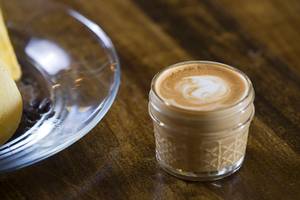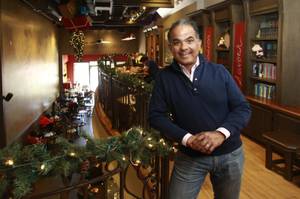MOTHERSHIP COFFEE ROASTERS
Where the beans come from: Mothership carries seven to 10 coffees, and beans sourced by importer Cafe Femenino come from female farmers in Rwanda, Guatemala and Peru. The organic, fair-trade Rwandan beans are grown by Hutu and Tutsi survivors of genocide. “99.9 percent—or probably more—of the coffee in the world is produced in absolute poverty,” owner Joshua Walter says. For that reason, and because coffee shops are about community, Walter asks, “Why wouldn’t you buy products that help other people?”
Where they’re roasted: Walter began roasting in the back room of his first shop, Sunrise Coffee, three and a half years ago, and expanded to open Mothership Coffee Roasters, a café, bakery and wholesaler. Mothership sells its coffee to local businesses such as the Beat, Eat and the Juice Standard.
Notable attributes: Most of Mothership’s coffees are single-origin, with the exception of some house espresso blends. Walter describes the Guatemalan as approachable, characteristic of comfort-style coffee, with a rich body and chocolatey flavor. The Rwandan, he says, “is a different animal”—light-bodied, refreshing, sweet with notes of red berry. “It’s juicy,” Walter says.
Specialty drinks: Mothership serves a stripped-down, purist menu of espressos, macchiatos, cappuccinos and one flavored latte, a mocha made with local chocolate. “We’re trying to be a model,” Walter says. “We want to elevate coffee in Las Vegas.” 2708 N. Green Valley Parkway, 702-456-1869.
MAKERS & FINDERS
Where the beans come from: 100-percent organic, fair-trade from Bolivia, Honduras, Peru and Colombia.
Where they’re roasted: Big Bend Coffee Roasters in Marfa, Texas. Roaster Joe Williams is a “third-generation Texan cattle rancher-turned-roaster,” Makers co-owner Josh Molina says. Makers’ Valeria Varela says they chose Big Bend for flavor, but also because it’s a smaller operation that has good relationships with farms and donates 10 percent of profits to Texan and Mexican charities.
Notable attributes: The Bolivian beans lend a silky, velvety chocolate-flavor; the stronger, light-roasted Columbian showcases mild citrus notes; the Honduran is a bright, breakfast-style; and the dark-roasted Peruvian has a tarry, roasted flavor.
Specialty drinks: Varela likes pour-over coffees, cold brew and the lavender latte, crafted with house-made lavender syrup. Molina touts two seasonal lattes: the coconut turmeric, which “looks like a yellow curry latte,” and the lemon bar latte, made with lemon zest, condensed milk, steamed whole milk, espresso and graham cracker crust. “We believe in fun coffee,” Molina says. 1120 S. Main St. #110, 702-586-8255.
PUBLICUS
Where the beans come from: Farm-specific beans come from Ethiopia, Kenya, Ecuador, Rwanda, Burundi, Guatemala, Colombia and Bolivia, and the shop carries four to six at a time. “They’re smaller lots that are higher quality,” PublicUs’ champion barista Cole McBride says of the beans, which are sourced by Minneapolis-based Cafe Imports. Either McBride or a Cafe Imports rep visits farms before purchasing from a single farm, so beans aren’t mixed with others from the region. “We want our coffees to be traceable,” Cole says.
Where they’re roasted: Velton’s Coffee Roasting Co. in Washington, a small-batch wholesale roaster McBride worked with in Seattle. He says roasters typically choose the beans, but for PublicUs’ brews, the tables are turned.
Notable attributes: This month, PublicUs began serving two Ethiopian coffees and three Kenyans. McBride says the crisp, bright Ethiopians are sweet and floral, with notes of jasmine, lavender and spring flowers. The Kenyans are “big and super-juicy,” with notes of sweet tomatoes and dark fruit, and a mouth feel of orange juice.
Specialty drinks: McBride recommends pour-overs for serious coffee drinkers; the ice-shaken latte, a crowd pleaser made with house-made almond milk; or his creative takes on cocktails like the espresso Old Fashioned, with sliced orange and Rainier cherry, or the coffee mint julep, with locally grown mint and bourbon extract. 1126 Fremont St., 702-331-5500.
SAMBALATTE
Where the beans come from: “I personally go to Brazil every year to meet the producers and bring the best,” says owner Luiz Oliveira, who seeks out environmentally conscious operations with big flavor. Sambalatte also carries coffees from Colombia, Guatemala, Indonesia and Ethiopia.
Where they’re roasted: At Sambalatte’s Monte Carlo location by master roaster Cedric Parlade. The beans are analyzed in a coffee lab, where Parlade determines how to roast them based on color, moisture and density.
Notable attributes: “I try to highlight the flavor of the bean,” Parlade says. If it’s a chocolatey bean, he’ll take care to brown but not burn it. Parlade is a certified Q Grader, a Coffee Quality Institute certification akin to a sommelier. There are 422 Q Graders in the U.S. and only two in Nevada.
Specialty drinks: Parlade recommends the 28-hour cold brew Samba Rock. “It’s brewed cold, kept cold and served cold,” he says. “It keeps the water pH low so it keeps the integrity of the flavor from the beginning to the end.” Keeping with Oliveira’s Brazilian roots, the bottled beverage debuted during Rock in Rio, tipping its hat to a subgenre of rock that laces Brazilian samba, bebop, jazz and soul. 750 S. Rampart Blvd. #9, 702-272-2333; Monte Carlo, 702-730-6789; 6555 S. Jones Blvd. #100, 702-434-2337.











